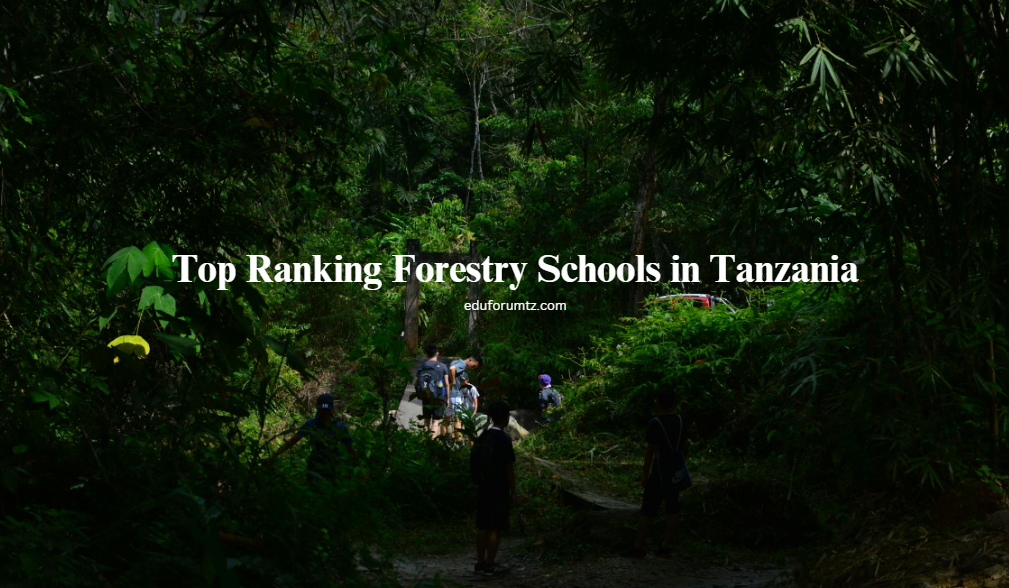
Top Ranking Forestry Schools in Tanzania: Finding the right school is crucial for students interested in pursuing a career in forestry. Tanzania offers some top-ranking universities known for their strong programs in this field. These institutions provide quality education, research opportunities, and resources that prepare students for various careers in forestry and environmental science.
Students can explore programs that focus on sustainable management, conservation, and practical fieldwork. With the growing emphasis on environmental issues, these schools play an important role in shaping future leaders in forestry. The knowledge and skills gained at these universities can significantly impact both local ecosystems and global sustainability efforts.
By choosing one of the top forestry schools in Tanzania, students can ensure they receive a solid education that opens doors to numerous career paths. Exploring these options may lead to exciting opportunities in a field that is vital for the health of our planet.
Overview of Forestry Education in Tanzania
Forestry education in Tanzania has evolved significantly over the years. It plays a crucial role in training professionals to manage the country’s vast forest resources. The programs offered are designed to address environmental, economic, and social challenges related to forestry.
Historical Development of Forestry Education
Forestry education in Tanzania began in the early 20th century during colonial rule. Initially, training focused on managing forests for timber production. After independence in 1961, the curriculum expanded to include conservation and sustainable practices.
In 1975, Sokoine University of Agriculture (SUA) was established, becoming a key institution for forestry studies. This marked a shift towards research and applied sciences in forestry education. Other universities, such as the University of Dar es Salaam, followed suit, offering diverse forestry programs aligned with national development goals.
Today, several universities in Tanzania provide forestry programs. These institutions offer bachelor’s, master’s, and doctoral degrees in forestry and related fields. They focus on topics like forest management, conservation, and agroforestry.
Additionally, practical training and field studies are emphasized to prepare students for real-world challenges.
This combination of historical context and current programs ensures that graduates are equipped to contribute to the sustainability of Tanzania’s forests.
Criteria for Ranking Forestry Programs
Ranking forestry programs involves several key criteria to ensure a fair and comprehensive evaluation. These criteria include:
- Research Performance: This is often measured by the number of publications and citations in relevant journals. Higher research output indicates a strong academic environment.
- Curriculum Quality: The strength and relevance of the curriculum are crucial. Programs that offer a diverse range of courses in forestry and related fields typically score higher.
- Faculty Expertise: Experienced and qualified faculty members contribute significantly to the program’s reputation. Their research and professional background are important factors.
- Resources and Facilities: Access to laboratories, libraries, and field equipment enhances the learning experience. Well-equipped programs often rank higher.
- Industry Connections: Partnerships with forestry organizations and industries provide students with practical experience and networking opportunities.
- Student Support Services: Support for students, including academic advising and career services, plays a vital role in program effectiveness.
- Graduate Outcomes: Employment rates and the success of graduates in the forestry field are assessed. Strong programs typically have higher employment rates for their graduates.
These criteria provide a structured approach to evaluating forestry programs, ensuring that prospective students can make informed decisions based on the quality and relevance of the education offered.
Top Ranking Forestry Schools in Tanzania
Here’s the summarized table for the universities Ranking Forestry Schools in Tanzania:
| University | Location | African Rank | World Rank | Acceptance Rate | Enrollment | Founded | Link |
|---|---|---|---|---|---|---|---|
| Sokoine University of Agriculture | Morogoro | 14 | 315 | 44% | N/A | 1984 | Sokoine University of Agriculture |
| University of Dar es Salaam | Dar es Salaam | 22 | 460 | 10% | 24,000 | 1970 | University of Dar es Salaam |
| Nelson Mandela African Institution of Science and Technology | Arusha | 79 | 1180 | N/A | 117 | 2009 | Nelson Mandela African Institution of Science and Technology |
| University of Dodoma | Dodoma | 173 | 2192 | 30% | 28,949 | 2007 | University of Dodoma |
| Muhimbili University of Health and Allied Sciences | Dar es Salaam | 188 | 2310 | 25% | N/A | 2007 | Muhimbili University of Health and Allied Sciences |
Career Prospects for Forestry Graduates in Tanzania
Forestry graduates in Tanzania have various career opportunities. The forestry sector is essential for environmental management and sustainable development.
Common Career Paths Include:
- Forest Management: Overseeing forest resources to ensure sustainability.
- Wildlife Conservation: Protecting wildlife habitats and biodiversity.
- Research and Development: Conducting studies on forest ecosystems.
- Environmental Consulting: Advising businesses on best practices for forest management.
Many graduates find jobs in government agencies, non-profit organizations, and private companies. They may work for the Ministry of Natural Resources and Tourism or conservation groups.
Key Skills for Success:
- Strong understanding of environmental science.
- Ability to conduct research and analyze data.
- Communication skills for community engagement.
- Knowledge of sustainable practices and policies.
Several organizations offer training and internships, which enhance job readiness. The Forestry Development Trust, for instance, provides opportunities for graduates to work on public-private partnerships in forest management.
With ongoing conservation efforts and demand for sustainable practices, the job market for forestry professionals is expected to grow. This allows graduates to contribute significantly to environmental sustainability in Tanzania.
Final thoughts
Choosing the right forestry school is vital for students aiming to build a career in this field. Tanzania offers several top-ranking institutions that provide quality education and training.
The University of Dar es Salaam stands out for its established programs and research initiatives. This institution is recognized for preparing students to tackle real-world challenges in forestry.
Another notable option is the Nelson Mandela African Institution of Science and Technology. This school focuses on practical skills and modern research, essential for today’s forestry sector.
Moreover, the University of Dodoma and Muhimbili University of Health and Allied Sciences also offer specialized programs. They equip students with the knowledge necessary for sustainable forest management and conservation practices.
Factors such as location, faculty expertise, and available resources should guide students’ choices. Cities like Morogoro, Dar es Salaam, Arusha, and Dodoma are ideal for studying forestry due to their academic opportunities.
Investing time in researching and visiting potential schools can help future students make informed decisions. Each school provides unique strengths that cater to different interests and career paths in forestry.
Also Read;
- Top Universities For Pediatrics in Tanzania: Leading Medical Institutions
- Top Universities For Zoology in Tanzania: Top Ranking
- Top Universities For Chemistry in Tanzania
- Top Universities For Environmental Science in Tanzania
- Top Universities For Liberal Arts and Social Sciences
- 2024 Top Universities For Nursing Courses in Tanzania: Full Guide
- 15 Best Medical Schools in Tanzania: Top Ranking Institutions 2024
- Top Universities for Information Technology(IT) in Tanzania 2023/2024: Full Guide

